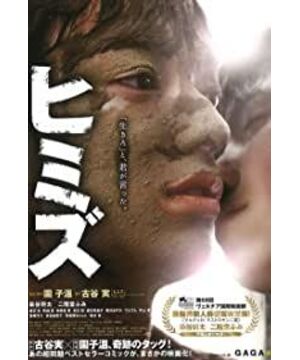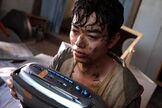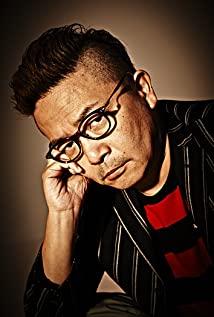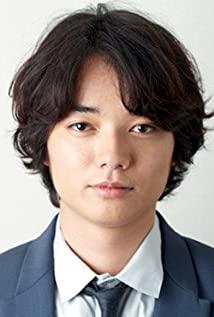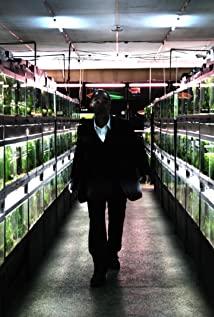The director is a cruel person. Cruel to the actor, cruel to the audience, but the most cruel is to himself, the actor is mainly responsible for presentation, and the audience is mainly responsible for receiving, and he left his footprints everywhere in the barren ruins after the disaster, and found a suitable carrier, and Before that, he had faced countless possible but inexact carriers. He is constantly searching, constructing, supplementing, deleting, and reconstructing until he is able to do his ideal basket. Yes, he wants to present the devastated society and people's devastation after the disaster in a meticulous and rich manner.
He asked to restore the reality as much as possible, using a lot of shaking, rotation, overlapping voiceovers, etc. to give the audience a personal and real character experience.
The use of a large number of symbols supports and enriches the theme level and connotation meaning of the film.
"The flies fall into the milk, black and white can be seen at a glance."
"I know everything, except myself."
After the disaster, people experienced life and death and leaving their homes. Everything around him, the heaviest reality becomes descriptive and comprehensible, seeping into the skin clearly and coldly. The body was dulled by the sudden shock, but the mind became clearer about what has happened and what will be faced in the future. With experience, everything becomes profound. But at the same time, he became confused and in a trance about life itself. Sumita has been receiving negative information from his father that "it's fine if you die", and his mother ignored him, and the debt collectors came to the door. Getting beaten up again and again and finding himself unneeded is in contrast to someone who is left with nothing in an earthquake of his own accord. But what they have in common is that they are shaken and confused about the value of their own lives. People become more and more unfamiliar and puzzled about themselves.
It is clear at a glance that the situation is dire; what you don't know is who you want to do and what you can do.
The half-submerged hut on the lake is a symbol of Japan's frustration and depression. The borrower who lost his relatives in the disaster will be hurt when he sees it. After killing his father, Sumita wandered on the road, spinning and repeating the characters' inner confusion and fragmentation of values. The same goes for putting colorful paint on your face. Repeatedly cut back to the mirror-like lake in front of the Sumita Boathouse. In addition to the explanation of parallel events, it also serves as a reminder of this symbolic meaning. The simple cut shots repeatedly remind us to think about the future of Japan today—that is, whether Sumita can change the status quo. In the end, Sumita picked up the gun in the washing machine—Sumita, who had repeatedly appeared in the dreams of several people, committed suicide with a gun, repeatedly implying that Sumita had gone astray, and now, it was finally the moment of decision that the gang boss said . The sound of a gunshot can be a self-destruction and farewell to the hopeless world, or it can be the dawn of dawn to clear up the past and regain a new life.
Jingzi woke up from the sound of gunfire and, facing the silence before dawn, threw all the curses he had accumulated into the lake. This move is like returning and clearing the scars Sumita gave her, but it is so kind and compassionate. So, she saw Sumita who was reborn, and said to her soaked, "Police station, Xue こ う". Surrender and suicide, one side is a way to survive, the other side is a dead end. He was finally retained by hope and cheered for himself.
In the film, Sumita and Keiko are soaked all over the body many times. It has to be mentioned here that the director was deeply influenced by Christianity. In Christianity, water is the image of God and also has the meaning of purification. Jingzi and Sumita came home on a rainy day, and the two fought in the water many times; the day after he killed his father, he jumped into the lake to wash his body covered in mud; Perhaps the director intends to point out that God is always guiding and instructing those who are in disaster. What's interesting is that when Uncle Yono broke into the house to steal, he was fighting with his master, and the TV was broadcasting a declaration that he did not believe in God, and believed that the nuclear power incident had not had much impact on people's health, so he could not give up nuclear power, "I don't think that Is there anything more important than life?" It seems ironic that not believing in God does not end well. So trust God.
The girl Keiko has always been inseparable from Sumita. At first, it was out of the love of a young girl, paying attention to and imitating every move of her sweetheart, empathizing with his experience, and cherishing the mutual pity of fellow travelers. But later, her actions were different from ordinary girlish feelings. No matter what happened, she was almost annoying, always supporting and supporting: it was very similar to God. God will never leave the world. And God has already meant otherwise.
Pay attention here to the symbolism of the colors. In the first half of the film, Jingzi comes here either in a school uniform or in black and white. And when Jingzi dreamed that Sumita shot at the temple, he changed into a red dress. Before that, the hanging platform was painted red and decorated warmly and romantically. The mother in red said, "We don't need this child, we can live happily." Red, red is the color of life and the color of death. In one shot, Jingzi's face is framed within the circle of the hanging rope. The unfortunate situation of the girl and Sumita was similar, and she shed tears while repeating the wish-like slogan. It's like self-destruction and rebirth.
The next day, she seemed to have forgotten her own situation, thinking about Sumita wholeheartedly. Jingzi does not represent God, she is the incarnation of the Virgin, and the light of hope shines forever.
Our Lady accompanied the Japanese after the disaster, namely Sumita Yiichi. He turned a blind eye to Jingzi's kindness at first, and only regarded it as trouble. Until I heard what the gang boss said and got the gun. The next morning when he saw Jingzi in a red dress, he read a poem, which also meant asking Jingzi for help and admitting his ignorance and confusion. The lost lamb, who neither surrendered nor committed suicide, finally took a step toward the glory of God. He bowed his head to confess his sins, and moved his heart to ask for forgiveness.
Our Lady is guided by God, so she will help the lost Lamb. She knows everything, she sympathizes with your suffering, and she knows your sins. Her guidance is the will of God. Don't be afraid, God will forgive your sins and give you happiness. So, go to the police station tomorrow and turn yourself in. Imagine that in the future, two people will get married and give birth to a child belonging to two people. The child will be happy to have such parents. Candlelight imagined, tears glistened.
If we are mediocrity, if we believe, God will love you - just as he loves all people in the world.
Live in the field, come on.
Live in the fields, don't die.
Live in the field and embrace your dreams.
The only flower in the world.
Live in the field, come on.
come on.
View more about Themis reviews


